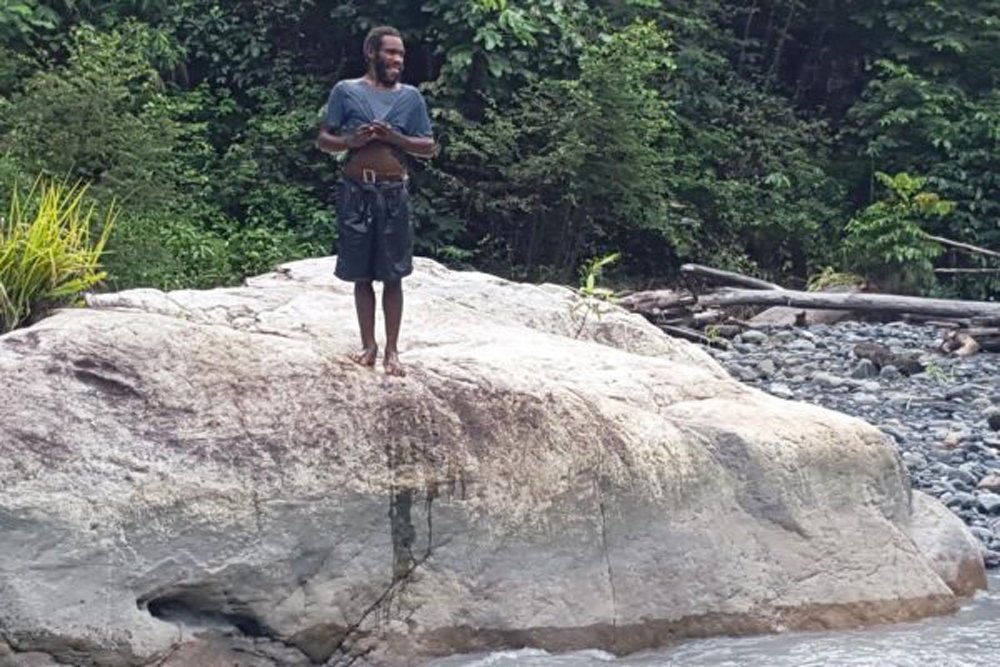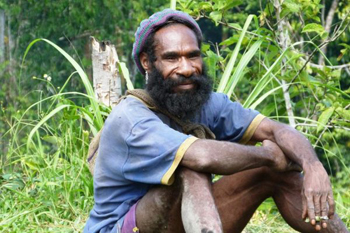“Why did you leave your brother’s house on the ridge top to move here,” I asked. “Did anyone from your family live in this area before?”
“Oh, no!” he said, with a big smile. “They never would have lived this close to the river for fear of the spirits.”
When I had first investigated into the culture and beliefs of the Hewa tribal people, I discovered they never built their huts on river bottoms or even on flat ground that had a nearby creek or marsh. It was common knowledge that the lowlands and river beds were where the deceptive and evil female spirits roamed.
If someone left the safety of the ridge tops to hunt in the flat grounds, they never went alone feeling they were less vulnerable to the spirit realm when they were in groups. They also were sure to bring a dog because they felt the dogs could sense the presence of spirits and would bark to scare them away. They were always wary, keeping their bows ready for a quick shot.
There were many stories of unexpected death that confirmed their dread of the lowlands. The ancestors told how some men had stumble across what appeared to be normal women in those kinds of places, only to get eaten after they let their guard down. There were even stories of men who encountered huge pigs, and then become entranced by a spell when the pigs turned into what they thought were lovely women. If they stayed to talk, their doom was certain. No one escaped those kinds of spirits.
“So then why did you leave your brother’s house on the ridge top and move down here?” I asked. “Are you not getting along?”
He let out a hearty laugh, filling the quiet afternoon with his booming voice. “Oh no, it’s not like that at all,” he said. “It’s just that since the boys have been teaching the Bible it dawned on me my family has been afraid of evil spirits for no reason.” He waved an arm in the direction of his brother’s house. “Before, my father and ancestors only built houses on ridge tops, convinced the evil spirits lurked in the valleys. But now that you have taught us about God’s power, I realize there is nothing to be afraid of. Why would I fear now that I am joined together with Jesus?”
I enjoyed sweet fellowship with Emo that afternoon, and later hiked back to my house with renewed joy. When tribal people told me they were no longer afraid of spirits, that was one thing, but when they actually made significant lifestyle changes, it showed they were convinced of the truth of God’s Word.
The next day when I was talking with a village friend about my conversation with Emo, he slipped in an additional piece of information I was not aware of. “Did you know there is a huge spirit rock near Emo’s house?” he asked. “Not only were our ancestors afraid of the lowlands, but more than that, they never walked past the place where Emo’s new house is for fear of the spirits they thought lived in the huge white rock in the middle of the river bed.”
With that new insight I decided to hike back to the river valley as soon as I had the opportunity. Later, when friends came from town to visit my co-worker, John and I, we decided to hike there together with a few village believers. When we arrived at the river’s edge and saw the huge bolder on the other side of the water, the young man named Fauwa was eager to tell us the story.
“We never came to this area,” he said. “My father, Watofo, told everyone to avoid this place for fear of our lives. He said there were many evil female spirits that lived inside the rock, and they would come out through holes and eat us if they had the chance.”
As he was talking, I noticed two holes on the side of the boulder. The animated way Fauwa told the story made it easy to envision a father talking to his son in a hushed voice, warning him to avoid a disastrous end. Before Fauwa’s father’s death, Watofo was a feared shaman, and his words would have carried significant weight.
“If for some reason we had to come through this valley,” Fauwa continued, “my dad said to hold my bow with an arrow ready to shoot, like this.” He put an arrow to the bamboo string on his bow and drew it half way, and then speaking in a hushed tone he crouched low as if sneaking through the tall weeds of the river bed, his eyes sweeping this way and that to detect hidden catastrophe. “When my dad said things like that I got scared, and made up my mind never to come down here.”
But then, Fauwa’s manner suddenly changed. “I’m not afraid anymore, and I’ll show you,” he said as he dropped his bow and arrows and spun to jump into the water. The current was strong and the water deep but he made his way across and climbed up the bank on the far side. He quickly jumped up on big rock and waved his arms in excitement. “I’m not afraid anymore.”

Thank you Lord for the way you are rescuing these precious people from their fear of the enemy and his lies. Thank you for drawing them to yourself and setting them securely on the solid foundation of Your truth. — Ethnos360
If you want to know more about a personal relationship with God, go here
Jonathan and Susan Kopf have been living with the Hewa tribal people in the mountains of central Papua New Guinea since 2000. To learn more about their work with Ethnos360, go here




